Harikishan Sharma, Senior Assistant Editor at The Indian Express' National Bureau, specializes in reporting on governance, policy, and data. He covers the Prime Minister’s Office and pivotal central ministries, such as the Ministry of Agriculture & Farmers’ Welfare, Ministry of Cooperation, Ministry of Consumer Affairs, Food and Public Distribution, Ministry of Rural Development, and Ministry of Jal Shakti. His work primarily revolves around reporting and policy analysis. In addition to this, he authors a weekly column titled "STATE-ISTICALLY SPEAKING," which is prominently featured on The Indian Express website. In this column, he immerses readers in narratives deeply rooted in socio-economic, political, and electoral data, providing insightful perspectives on these critical aspects of governance and society. ... Read More
In Bundelkhand, Modi labharthis ask for more: ‘Bijli hai, paani hai… par mukhya cheez hai rozgar‘
Across a 400-km stretch of one of the country's most backward regions, lack of jobs, paper leaks, fall in recruitments a constant refrain
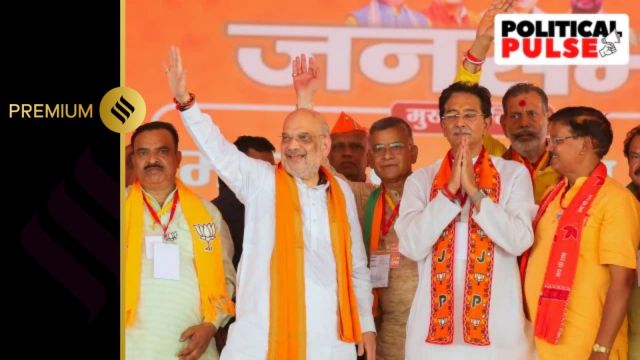 Union Home Minister Amit Shah with BJP candidate from Jhansi constituency Anurag Sharma and others during a public meeting for the Lok Sabha elections, in Lalitpur district. (PTI)
Union Home Minister Amit Shah with BJP candidate from Jhansi constituency Anurag Sharma and others during a public meeting for the Lok Sabha elections, in Lalitpur district. (PTI)Over the past 10 years, the Narendra Modi government has knit a net of welfare schemes that, at their widest, provide a cushion to around 22 crore families. This “labharthi varg” has paid rich dividends for the BJP in successive elections, prompting Opposition parties to promise and implement their own basket of schemes.
In the latest such move, Congress president Mallikarjun Kharge promised this week to double the free rations available to the poor to 10 per kg per month if the INDIA bloc was voted to power – thus “bettering” one of the Modi government’s more popular schemes, Pradhan Mantri Garib Kalyan Anna Yojana (PMGKY).
The Indian Express met beneficiaries of various Central government schemes across a stretch of about 400 km through Uttar Pradesh’s Bundelkhand region and found a categorical consensus on the safety net the schemes provide. At the same time, however, there’s hardly a conversation where the issue of jobs does not come up. Almost as if a job is the primary “benefit” the young are waiting for.
Incidentally, it was in Bundelkhand in July 2022, soon after the Uttar Pradesh Assembly elections, that PM Modi first denounced “freebies” – as offered by the Opposition – as “revdi culture”.
The Bundelkhand region has four parliamentary constituencies – Banda, Jalaun, Jhansi and Hamirpur. All have been held by the BJP now since 2014 – with significant winning margins and a vote share of above 50 per cent in three of the four seats. The party has repeated its sitting MPs — all four seats go to polls May 20.

Jhansi
At Danipura village in Jhansi district, Monu Rayakwar, 23, who has finished his B.Sc (Biology) from Dr R D Richhariya College, is preparing for a range of competitive exams – Short Service Commission, Railways, Uttar Pradesh Police. Earlier this year, he appeared in one UP Police recruitment exam, but that got cancelled following a paper leak.
He takes coaching classes in person at a centre in nearby Barua Sagar town, plus online classes, costing Rs 1,400 a month. Rayakwar says such cancellations “cost candidates a lot – from application fee, Rs 700-800, to preparation and appearing in exams… in places like Kanpur and Lucknow”. “We feel cheated.”
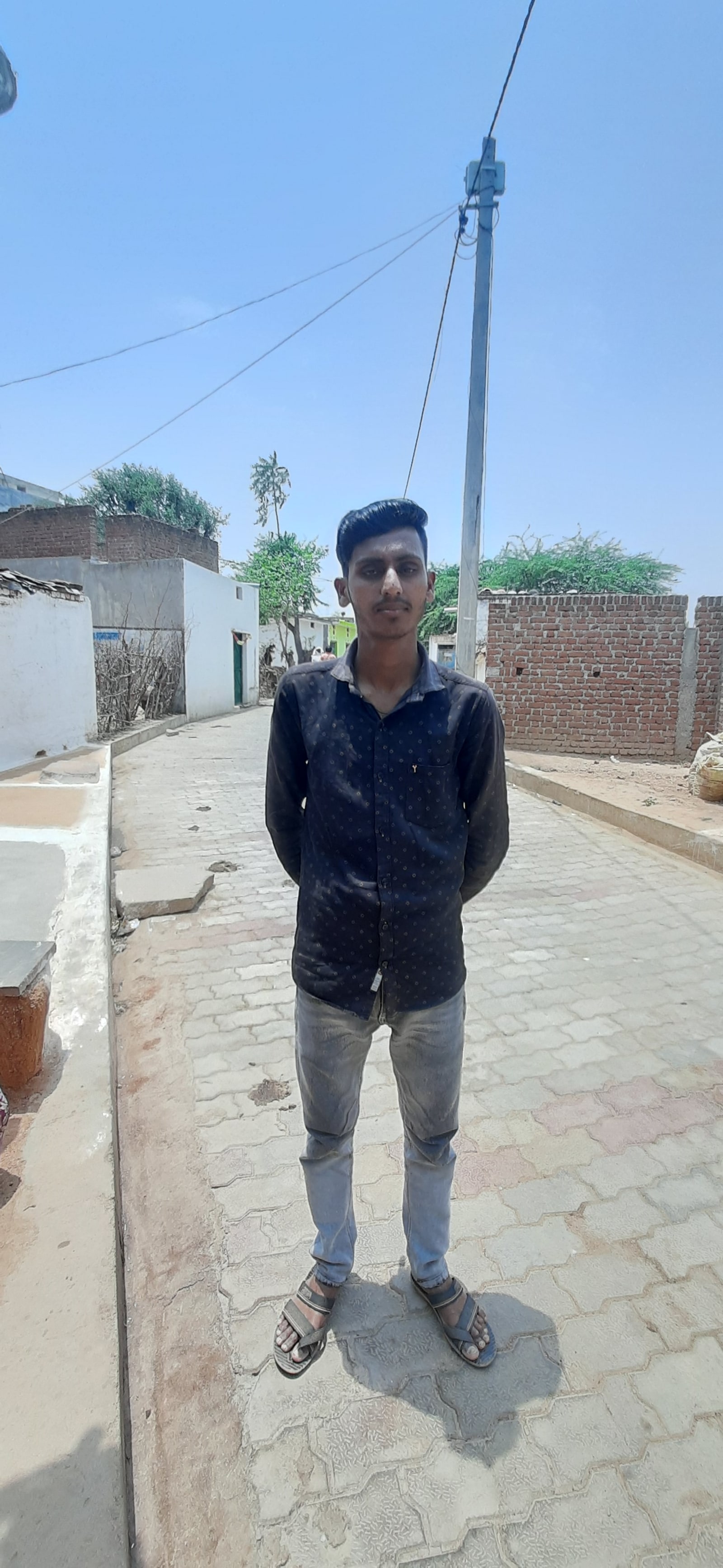 Monu Rayakwar, 23
Monu Rayakwar, 23
Rayakwar’s father is a truck driver while his elder brother, who has done a diploma in computer training, works at a stone crusher in Jhansi. Their earnings help sustain his coaching.
The Rayakwars got funds under Swachh Bharat to build a toilet, and have Ayushman Bharat cards, which they have not had to use so far.
But what weighs on Rayakwar’s mind is what next. Many men and women of his age want to pursue higher education, he says, but “paison ki wajah se peechhe chhoot jaate hain (they get left behind due to lack of resources)”.
The story of Abhay Kumar, 21, is similar – coaching at a private centre in Barua Sagar, online classes for Rs 1,000 per month, and the cancelled UP Police exam behind him. His hope is to get a job in the Railways. “But vacancy hi nahin nikalti (there is no recruitment).”
Dayaram Raykar, 73, who retired as a government teacher, says: “It is true that we have toilets now, houses, water… But is that leading to jobs?… Bijli hai, paani hai… lekin mukhya cheez hai rozgar (There is electricity, there is water, but the main thing is employment).”
Adding that farming has become unviable, Raykar rues that “padh likh kar (after all that education)”, his son now works for a contractor in Delhi.
An investigation by The Indian Express, published in February this year, showed that 1.4 crore job seekers across 15 states had been affected by paper leaks over the past five years. The Centre has tried to crack down with a stringent law against paper leaks, as have some state governments.
Meanwhile, cheap data and rich promises mean more and more youths are getting enrolled for online classes in the hope of government jobs.
Pradip Jain Aditya, the joint candidate of the Congress-Samajwadi Party from Jhansi, lists work done by him as Jhansi MP between 2009 and 2014, and initiatives taken by the then UPA government. He also refers to the Congress manifesto promise to fill government vacancies.
Slamming the Modi government, Aditya adds: “The government thinks that with just 3 kg wheat and 2 kg rice, log ghar par baithe rahenge (people will be content).”
Speaking on the sidelines of a meeting for BJP sitting MP and candidate Anurag Sharma, Jhansi BJP MLA Ravi Sharma says the NDA government has taken several steps to provide employment for youths, particularly in Bundelkhand, talking about the upcoming Defence Corridor and Bundelkhand Industrial Development Authority.
Mahoba
About 100 km away from Danipura, at Bahadurpur Kalan village in Mahoba district, Krishnakant, 20, asks why there is “no proper system or schedule” for state examinations. “If any vacancy comes at all, the paper gets leaked or delayed,” says Krishnakant, who is doing his Masters in English from Bundelkhand University and is enrolled for online coaching, at Rs 8,000 annually.
At his graduation, he qualified for an annual government scholarship of Rs 4,000, while his family receives Rs 2,000 under PM-Kisan every fourth month.
However, beyond assured food and clothes, their options remain limited, Krishnakant says. “Everything needs money… How many families are in good financial shape? People can keep preparing for three years, four years, but if there is no recruitment, what do they do?”
 Krishnakant, 20
Krishnakant, 20
Once youths like him always had the Army, the 20-year-old adds. But the new Agnipath policy “kharab hai (is bad)”. As per the new policy, only a quarter of those enrolled get absorbed into the Army, while others are “retired” after four years with some monetary benefits.
A first-time voter, Krishnakant says some farmers are “leaning towards” the Samajwadi Party this time, willing to give it a chance.
In the 2019 Lok Sabha elections, fought by the SP and BSP in alliance, the SP had contested Jhansi and Banda seats, getting a respectable 32.13% and 40.49% of the votes, respectively. In Jalaun and Hamirpur that the BSP fought, it got 37.44% and 29% of the votes. Across the four seats, the Congress vote share was 10% or below.
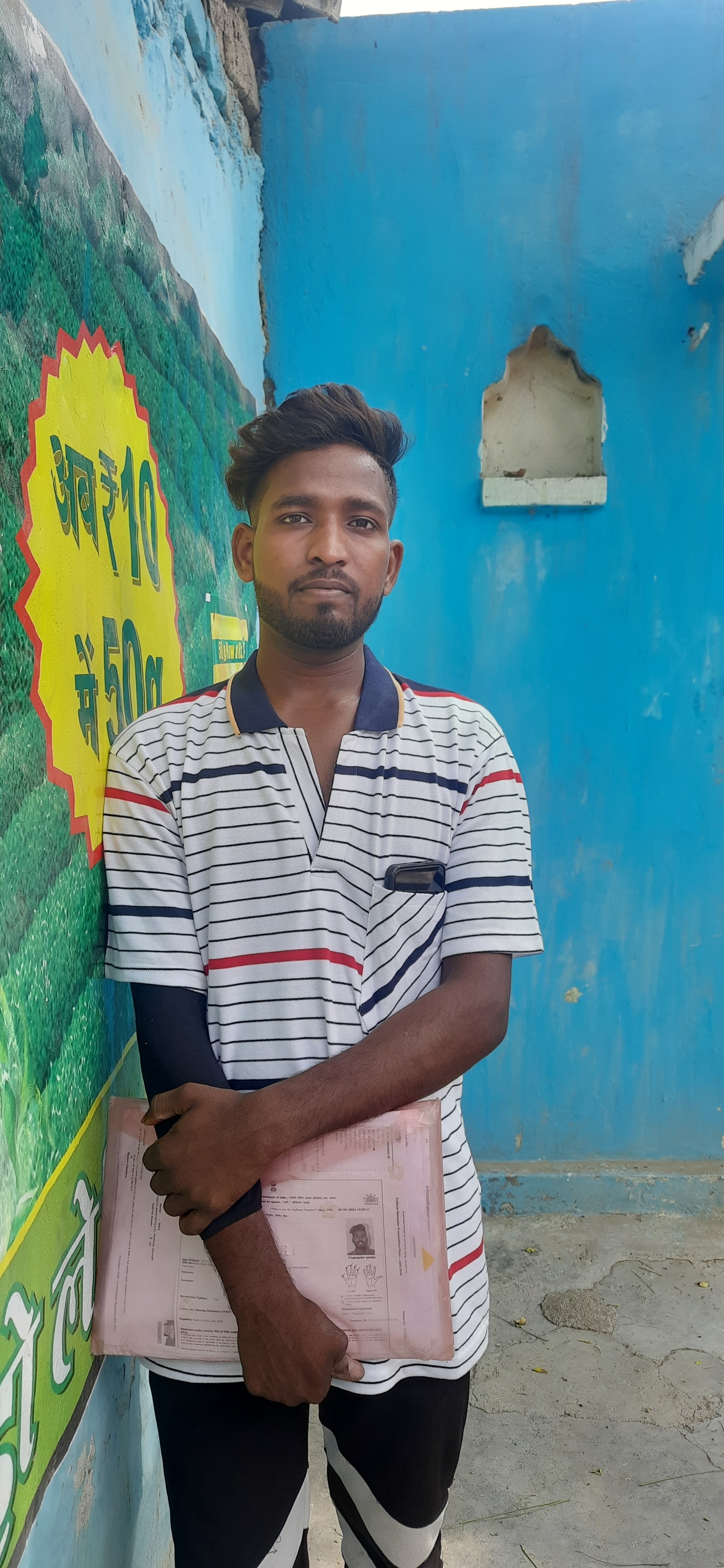 Umashankar, 18
Umashankar, 18
Umashankar, 18, of the same village as Krishnakant and a first-time voter as well, says he will choose a party that works for “betterment of youths” – for “rozgar aur sarkari naukri (employment and government jobs)”.
His family receives free rations under the PMGKY, and has Ayushman Bharat cards. Umashankar, who is doing BA from Bundelkhand Navodaya Mahavidyalaya, got a one-time scholarship of Rs 6,500 under the government’s Post-Matric Scholarship for OBC Students 2023-24.
Chitrakoot
Emerging from a ‘Digital Library’ at Karwi, the headquarters of the Chitrakoot district’, Antara, 24, who gives only her first name, says she is a postgraduate in English and a B.Ed, has cleared the Central Teacher Eligibility Test, and is now preparing for the SSC. But, where are the vacancies, she asks. “And when there is one, the paper leaks.”
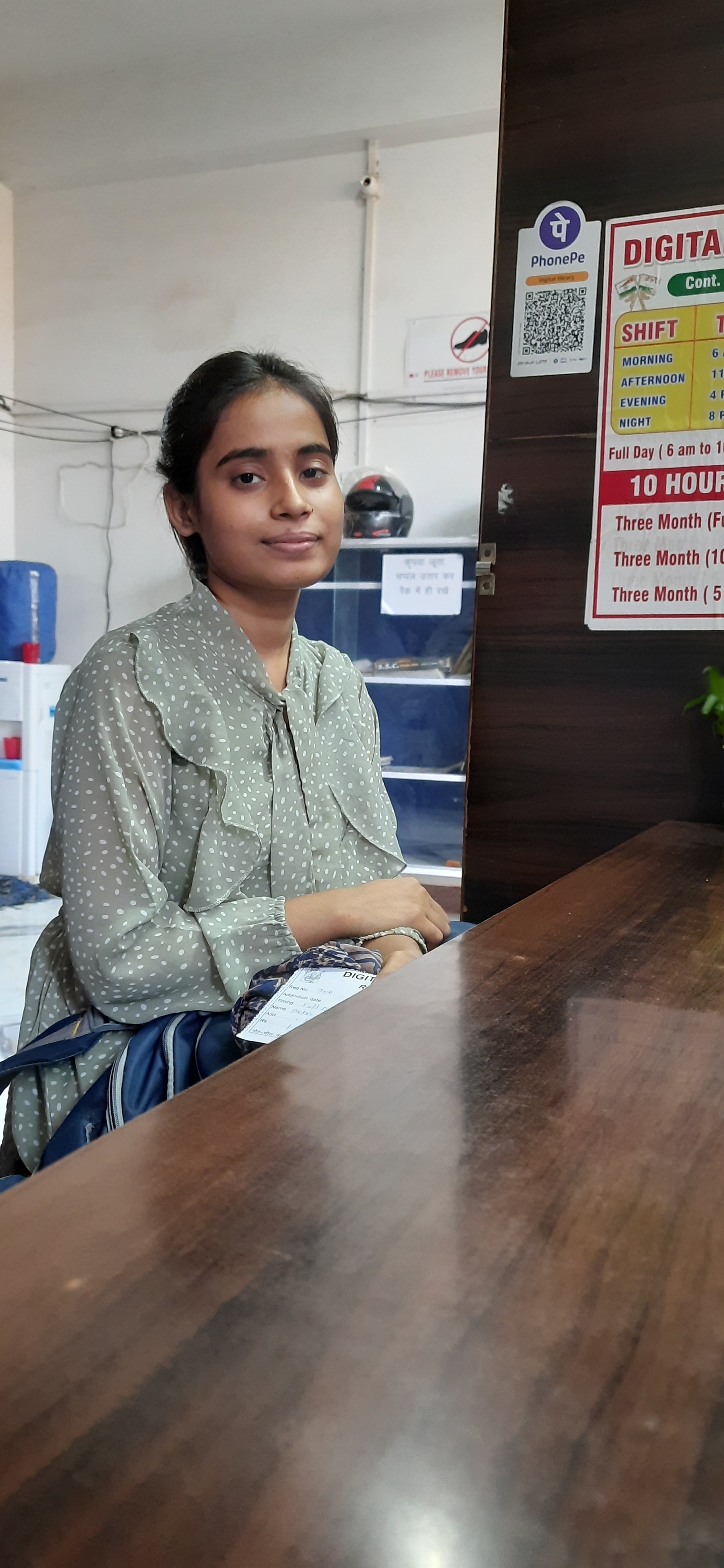 Antara, 24
Antara, 24
On the highway to Prayagraj, sitting at his roadside grocery shop in village Gosainpur, Sushil Mishra, 32, is reading a book titled ‘Reasoning’. He is preparing for “TGT (Trained Graduate Teacher)” exam, and is enrolled for online coaching.
He says he decided to try for a government job after working for three private firms as security supervisor in Delhi, Mumbai and Pune, earning about Rs 3,500 a month.
Owner of 2 bighas, Mishra says he has got all instalments under PM-Kisan since the scheme was launched in 2018, but that has hardly been enough. Apart from the grocery shop, he also runs a puncture repair shop in front of his mud house. “Pichle paanch sal se bahut pareshan hain, isliye yeh khola hai (Times have been very bad for the past few years, which is why I have opened this shop).” And then, paper leaks happen. “Manobal toot jata hai (It shatters our confidence).”
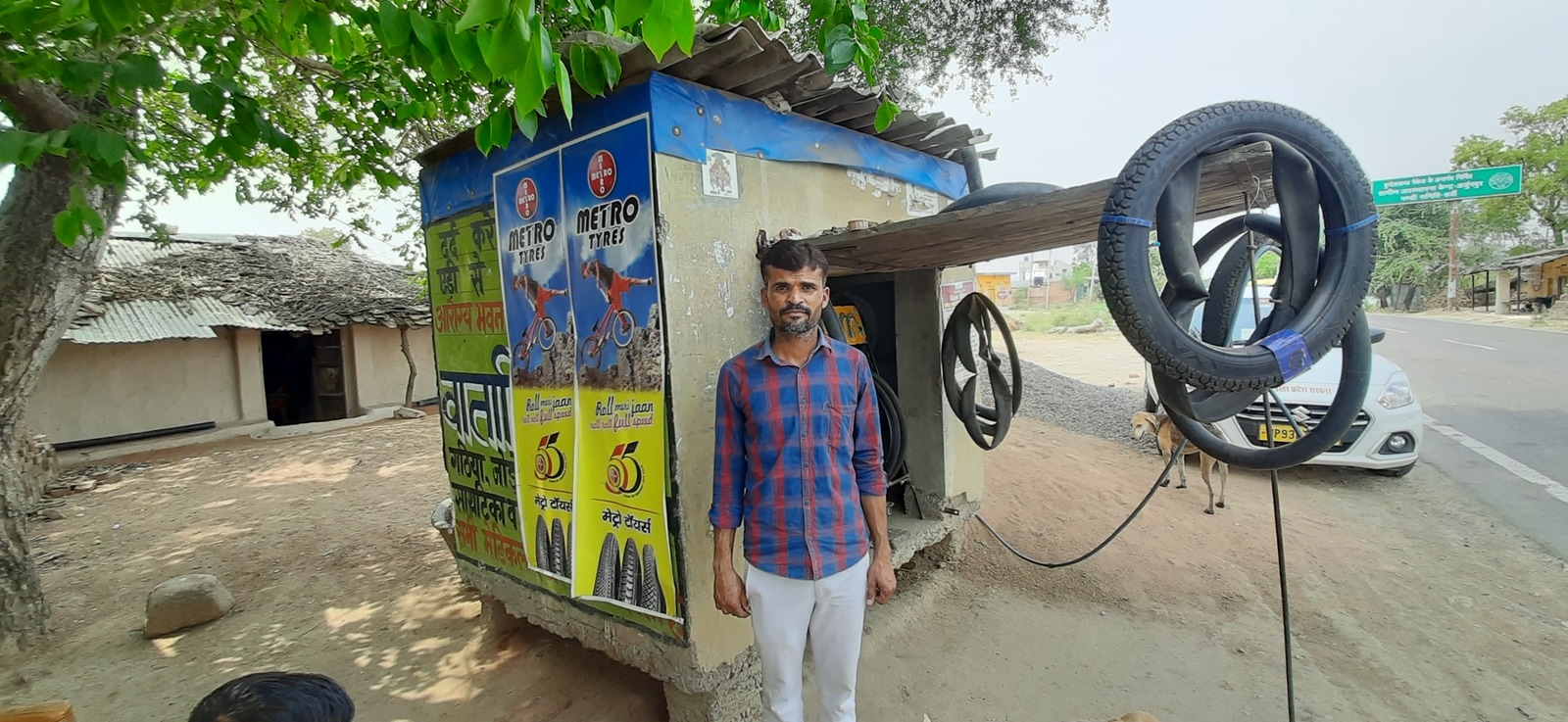 Sushil Mishra, 32
Sushil Mishra, 32
This is why, a “kattar (hardcore)” BJP supporter like him is having second thoughts, Mishra adds. “Is baar andar se kasht bhi hai. Sarkaar ne kuchch nahin kiya. Sapna kuchch alag tha, hua kuchch alag (There is a lot of pain. The government did nothing. Promises were for something, and something else is the reality).”
Across the road lives Pintoo Prajapati, 21, who is giving a coat of paint to the house allocated to his father under Pradhan Mantri Awas Yojana-Gramin. His father, Kshetrapal, who is a potter, owns a small plot of land and receives PM-Kisan instalments. The family has Ayushman cards, plus BPL ration card and receives free foodgrains.
But after studying till Class 12, Prajapati dropped out, and now works as a mason. Why should he have continued, he asks. “Where are the government jobs?”
His neighbour Gendapal butts in: “Panch kilo ration kitne din khaa lenge (How many days can we eat free 5 kg ration)?”
Prem Singh of Badokhar Khurd village in Banda, who owns a mango orchard and identifies himself as a progressive farmer and entrepreneur, talks about the social implications of lack of job security. “Many youths have spent years waiting for government jobs and are not getting married.”






- 01
- 02
- 03
- 04
- 05


























